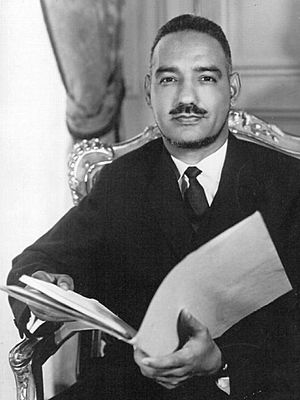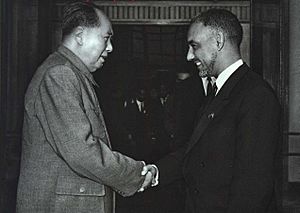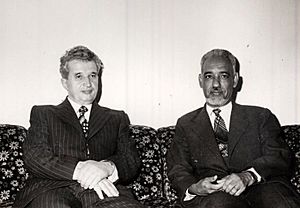Moktar Ould Daddah facts for kids
Quick facts for kids
Moktar Ould Daddah
مختار ولد داداه |
|
|---|---|

Ould Daddah in 1960
|
|
| 1st President of Mauritania | |
| In office 28 November 1960 – 10 July 1978 |
|
| Preceded by | Position established |
| Succeeded by | Mustafa Ould Salek |
| 1st Prime Minister of Mauritania | |
| In office 21 May 1957 – 20 August 1961 |
|
| President | Himself |
| Preceded by | Office established |
| Succeeded by | Office abolished (eventually Ahmed Ould Bouceif as Prime Minister in 1979) |
| Personal details | |
| Born | 25 December 1924 Boutilimit, French Mauritania, French West Africa |
| Died | 14 October 2003 (aged 78) Paris, France |
| Nationality | Mauritanian |
| Political party | Mauritanian People's Party |
| Relations | Ahmed Ould Daddah (half-brother) |
Moktar Ould Daddah (Arabic: مختار ولد داداه, romanized: Mukhtār Wald Dāddāh; December 25, 1924 – October 14, 2003) was an important Mauritanian leader. He guided the country after it became independent from France. Daddah was the first Prime Minister from 1957 to 1961. He then became the first President of Mauritania. He held this role from 1960 until a military coup removed him from power in 1978.
During his time as leader, he created a one-party state. This meant his Mauritanian People's Party was the only legal political group. He followed a policy called "Islamic socialism". This included the government taking control of many private businesses. In his writings, Daddah worried that the issue of slavery in Mauritania could cause conflict. He feared it might even destroy the country.
In foreign policy, he joined the Non-Aligned Movement. This group of countries did not take sides in the Cold War. He also had strong ties with Mao Zedong and China. However, he still accepted help from Western countries, especially France. As president, Mauritania faced conflict with the Polisario Front. This happened in Western Sahara after a deal to divide the territory with Morocco.
Contents
Early Life and Education
Moktar Ould Daddah was born into a respected family in Boutilimit, Mauritania. This was part of French West Africa at the time. He went to special Islamic schools. Later, he worked for the French government as a translator.
He studied law in Paris, France. He was the first Mauritanian to earn a university degree. In 1955, he became a lawyer in Dakar, Senegal. When he returned to Mauritania in the late 1950s, Daddah joined a political group. This was the Mauritanian Progressive Union. He became the head of its Executive Council.
In 1959, he started a new political party. It was called the Mauritanian Regroupment Party. In the last elections before independence, his party won every seat. He was then made Prime Minister.
Building Unity in Mauritania
Daddah was known for bringing people together. He could create agreement among different political parties. He also helped unite Mauritania's three main ethnic groups. These were the White Moors, Black Moors, and Black Africans.
Because his government included all groups, the French trusted him. Mauritania gained independence under his leadership in 1960. Daddah became the temporary President of the new republic. He was officially confirmed in this role after an election in August 1961.
Leading Mauritania (1960-1978)
As President, Daddah changed some of his earlier ideas. In September 1961, he formed a "government of national unity." This included the main opposition party. By December, he had the four largest parties merge. They formed the Mauritanian People's Party (PPM). This party became the only legal one in the country.
He made this one-party state official in 1964. A new Constitution created a strong presidential system. Daddah believed Mauritania was not ready for a Western-style multi-party democracy. Under this one-party system, Daddah was re-elected. He won elections without opposition in 1966, 1971, and 1976.

In 1971, Daddah served as President of the Organization of African Unity (OAU). However, his policies at home faced criticism. Mauritania's economy still relied heavily on aid from China and France. Also, a severe drought hit the Sahel region from 1969 to 1974. The price of iron exports also fell. These issues greatly lowered living standards for many people.
In 1975, he introduced a new plan. It called for Mauritania to be an "Islamic, nationalist, centralist, and socialist democracy." This plan was popular at first. Many opposition groups welcomed it.
Conflict in Western Sahara
The war in Western Sahara eventually led to the end of Ould Daddah's rule. Mauritania fought against the Polisario Front. This group was made up of local people fighting for independence. The conflict began in 1975 after Morocco and Mauritania tried to take over the territory together.
Ould Daddah had claimed the territory as part of "Greater Mauritania" since 1957. But this idea did not have much support among the people. Many Mauritanian Moors are related to the Sahrawis. Many tribes had members on both sides of the border. A lot of them supported the Polisario's fight for independence.
Challenges and Economic Impact
Thousands of Mauritanians left to join the Polisario. They went to camps in Tindouf Province. People in the South were also unhappy. Black troops from the South were sent to fight. They saw it as a conflict between Arab groups. They worried it would make Ould Daddah's unfair rule even stronger. This was because new Moorish citizens would be added to the country.
But Ould Daddah also wanted the territory to stop Morocco from getting it. He was still worried about Morocco's past claims on Mauritania.

After the Madrid Accords with Spain, Mauritania took control of a southern part of the territory. They renamed it Tiris al-Gharbiya. However, Mauritania's small and poorly trained army struggled. They could not stop the guerrilla attacks. Even with help from the French Air Force, they failed.
The Polisario then began attacking the iron mines in Zouerate. This caused Mauritania's economy to decline. Daddah's public support dropped sharply. In 1976, the capital city, Nouakchott, was attacked by the Polisario Front. Daddah was forced to appoint a military officer to lead the defense ministry.
Overthrow and Later Years
On July 10, 1978, Lt. Col. Mustafa Ould Salek led a military coup. He removed Daddah from power. A military government took over the country. Daddah's successors later gave up Mauritania's claims to Western Sahara. They withdrew from the war the next year.
After being imprisoned, Ould Daddah was allowed to go to exile in France in August 1979. There, he formed an opposition group. It was called the Alliance pour une Mauritanie Democratique (AMD). His attempts to overthrow the government from abroad were not successful.
Ould Daddah was allowed to return to Mauritania on July 17, 2001. However, he died soon after. He passed away in a military hospital in Paris, France on October 14, 2003, after a long illness. His body was flown back to Mauritania, where he was buried.
Honours
 Empire of Iran : Commemorative Medal of the 2500th Anniversary of the founding of the Persian Empire (October 14, 1971).
Empire of Iran : Commemorative Medal of the 2500th Anniversary of the founding of the Persian Empire (October 14, 1971).
See also
 In Spanish: Moktar Ould Daddah para niños
In Spanish: Moktar Ould Daddah para niños
 | Roy Wilkins |
 | John Lewis |
 | Linda Carol Brown |

